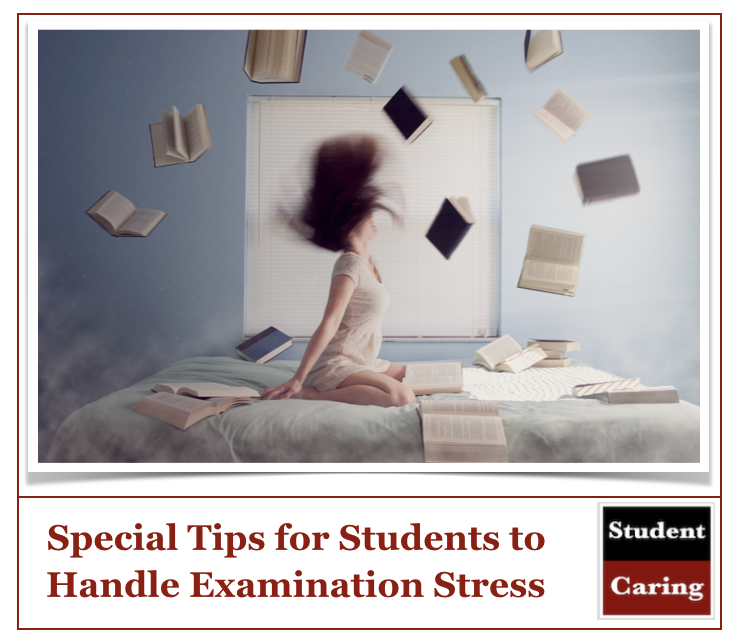Once you’ve graduated and been released into the so-called ‘real’ world you quickly realize one thing – nothing in life is quite as stressful as the night before an exam.
This news is of course no help to any students who still have exams ahead of them. I’m just mentioning it now to let you know things do get better. They do. Believe me. Just hang on in there.
First you have to get through the next few days, weeks, months of revision and tests. And sometimes the stress can feel almost overwhelming.
Well, don’t despair there are a few things you can do to help take the edge of the anxiety and no, before you ask, none of them involved self-medication.
Exercise More
Stress of all types, be it work stress or exam stress is fueled by a hormone called cortisol. Also known quite helpfully as the ‘stress hormone’. When we worry about exams it’s cortisol that floods our system and causes that tightness in our chest and queasy feeling in our stomach.
For the vast majority of human existence cortisol has played a very helpful role in keeping us alive. It’s the thing that sharpens our reactions and asks us should we fight or should we flee when we see a bear-shaped thing hiding behind a tree.
Now that dodging bears plays a much less frequent a role in our daily life, cortisol quite often causes more problems than it solves. This is because cortisol is generally depleted by exercise and now we no longer fight and flee quite so much the hormone is not burnt off – it simple remains in our system keeping us tense. This is especially true during revision time when we spend most of our days sat hunched over a desk.
So what to do? Simple really, get out and get sweaty that’s what! Hit the gym, go for a jog, do some star jumps in the garden or chase a squirrel around the park. What you do isn’t important, just make sure that once a day you spend 30 minutes doing some form of exercise. This is will keep you healthy and burn off cortisol, making you less stressed.
It will also help you sleep better. Speaking of sleep…
Sleep more, study less
Students, this probably isn’t advice you hear very often but I am hear to tell you that the secret to success whether it be during exam time, or just in everyday life, is sleeping more.
Now, this is different from sleeping in until 11 am every morning and missing your lectures. But ensuring that you get your doctor-recommended 7-9 hours sleep a night is vitally important. Not just for your mental and physical health but also for the health of your exam marks.
Why? Because sleep and your memory are strongly linked.
Neurologists separate memory into three distinct stages, acquisition, consolidation and recall. Respectively these three stages concern themselves with how accurately we record information in the first place, how well information is stored in our long-term memory and how accurately we are able to retrieve information when called upon.
The performance of each of these three stages is significantly improved when we are well-rested. What’s more, missing just one or two hours sleep a night has the same effect as having two or three alcoholic drinks. You wouldn’t walk into an exam hall drunk would you? So why would you contemplate doing so sleep deprived?
Bear this in mind the next time you are making the decision to stay up the night before a exam cramming frantically.
In addition to this, when we sleep, cortisol (there’s that word again) is flushed from our system. So not only will sleeping more improve your memory it will also mean you are significantly less stressed when you sit down to take your exam.
Knowing you should get more sleep and actually doing so are two very different kettles of fish, if you’re struggling to get the shuteye you know your exams require then head on over to the Sleep Advisor for some practical and science-backed advice.
Cut of the caffeine
Look around your desk, if strewn amongst the papers and books are half a dozen empty energy drinks and a few cups of coffee then congratulate yourself – you my friend a student stereotype.
Caffeine is great as a pick me up but it is also the enemy of a calm mind. This is because caffeine is also linked strongly to stress. Why? Because caffeine can artificially raise the level of cortisol in your system. Yep, cortisol. There it is again.
So, what to do. Well, if you have listened to my first two tips about exercising more and getting more sleep hopefully your body will be craving less caffeine. Which is great because being dependent on any artificial stimulant is not a good place to be, especially during exam time when you want to be at your most naturally sharp. The risk of a caffeine crash hitting mid-exam is too big a chance to take.
Well, there you have it, my top three tips to minimize exam time stress. Give them a go and above all remember, exams results are important but not as important as your health. Study hard but study sensible. Good luck!
###
April 23, 2018



0 Comments